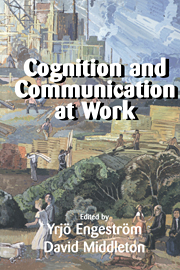Book contents
- Frontmatter
- Contents
- Contributors
- Acknowledgments
- 1 Introduction: Studying work as mindful practice
- 2 Distributed cognition in an airline cockpit
- 3 Constituting shared workspaces
- 4 Seeing as situated activity: Formulating planes
- 5 Convergent activities: Line control and passenger information on the London Underground
- 6 Users and designers in mutual activity: An analysis of cooperative activities in systems design
- 7 System disturbances as springboard for development of operators' expertise
- 8 Expert and novice differences in cognition and activity: A practical work activity
- 9 The tensions of judging: Handling cases of driving under the influence of alcohol in Finland and California
- 10 Talking work: Argument, common knowledge, and improvisation in teamwork
- 11 The collective construction of scientific genius
- 12 Experience and the collective nature of skill
- 13 Working together: Symbolic interactionism, activity theory, and information systems
- 14 On the ethnography of cooperative work
- Index
7 - System disturbances as springboard for development of operators' expertise
Published online by Cambridge University Press: 05 June 2012
- Frontmatter
- Contents
- Contributors
- Acknowledgments
- 1 Introduction: Studying work as mindful practice
- 2 Distributed cognition in an airline cockpit
- 3 Constituting shared workspaces
- 4 Seeing as situated activity: Formulating planes
- 5 Convergent activities: Line control and passenger information on the London Underground
- 6 Users and designers in mutual activity: An analysis of cooperative activities in systems design
- 7 System disturbances as springboard for development of operators' expertise
- 8 Expert and novice differences in cognition and activity: A practical work activity
- 9 The tensions of judging: Handling cases of driving under the influence of alcohol in Finland and California
- 10 Talking work: Argument, common knowledge, and improvisation in teamwork
- 11 The collective construction of scientific genius
- 12 Experience and the collective nature of skill
- 13 Working together: Symbolic interactionism, activity theory, and information systems
- 14 On the ethnography of cooperative work
- Index
Summary
Introduction
Our research studies transitions that occur when new technologies are implemented in industrial work processes. We are particularly interested in analyzing the developmental dynamics of production processes, and are concerned with examining the production process as a “sociotechnical system.”
The effect of technology can be seen to be mediated by social activity in two senses. First, any technology is itself socially constructed and therefore only one alternative of several possible ones. Second, the technology takes its concrete shape through use and is therefore influenced by the choices of the users. In this chapter we especially concentrate on the latter aspect of the social mediation of technology; i.e., we examine the role of operators in constructing the sociotechnical system through the use of technology as a tool of activity.
The dynamics of change in sociotechnical systems
Due to the principal difficulty, even impossibility, of anticipating precisely the functional and economic constraints of a system in its future operation, which is also reflected in internal difficulties in organizing the design process, a system in design deviates from one in operation. The more complex the system is, and the more flexibly it is expected to function in future use, the more difficult it is to predict and specify during design.
As a consequence, there exists a need to develop the design activity (Rouse & Cody 1988; Martin et al., 1990). As the design process has become an object of research, the inadequacy of different formal design models to comprehend the actual design activity has become apparent (Rouse & Cody, 1988; Hyötyläinen et al. 1990).
Information
- Type
- Chapter
- Information
- Cognition and Communication at Work , pp. 159 - 176Publisher: Cambridge University PressPrint publication year: 1996
Accessibility standard: Unknown
Why this information is here
This section outlines the accessibility features of this content - including support for screen readers, full keyboard navigation and high-contrast display options. This may not be relevant for you.Accessibility Information
- 11
- Cited by
